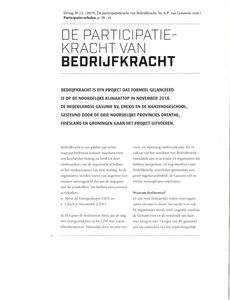Martien Visser vraagt zich af wie eigenlijk verantwoordelijk is voor de betrouwbaarheid van de energievoorziening.
LINK
This report is a deliverable of the ESTRAC “Case Studies Regional Energy Transition” project, commissioned and funded by the research institute Energy Systems Transition Centre (ESTRAC). ESTRAC is a joint initiative of knowledge and research institutes in the Netherlands – including TNO, ECN (since April 2018 part of TNO), University of Groningen, Hanze University of Applied Sciences, the New Energy Coalition (NEC) and, more recently, PBL – as well as associated partners including Gasunie, Gasterra, EBN and NAM. In addition to funding from the ESTRAC partners, the Case Studies Regional Energy Transition project has benefitted from funding by the Green Deal program of the Dutch government.
DOCUMENT

At RenQi, a laboratory founded by Gasunie, TNO and Hanze University of Applied Science, R&D projects are carried out to contribute to a sustainable energy future. Stakeholders over the value chain, from fundamental research to the development of business models cooperate in an “open innovation” setting.
DOCUMENT
Voor u ligt de eindrapportage van het project Transforming Regions dat binnen het zogenaamde ESTRAC-project is uitgevoerd. ESTRAC staat voor Energy Transition Centre, een langlopend (2017-2021) publiek-private samenwerking tussen Rijksuniversiteit Groningen, Hanzehogeschool Groningen, TNO, New Energy Coalition (penvoerder) en (financierende) partners provincie Groningen, NAM, EBN, Gasunie en Gasterra. Doel van dit Transforming Regions onderzoek was om vanuit verschillende sectoren - industrie en gebouwde omgeving - kennis te ontwikkelen voor het terugdringen van de CO₂ uitstoot en het verduurzamen van onze samenleving op lokaal en regionaal niveau. Dit rapport gaat over het de gebouwde omgeving en richt zich met name op het ontwikkelen van benaderingen die de besluitvorming voor belanghebbenden ten aanzien van het lokale en regionale energiesysteem ondersteunen. Voor Transforming Regions verschijnt ook een rapport over de industrie.
DOCUMENT
Bedrijfkracht is formeel gelanceerd op de Noordelijke klimaattop 2018. De Nederlandse Gasunie BV, Enexis en de Hanzehogeschool, gesteund door de drie Noordelijke provincies Drenthe, Friesland en Groningen, zijn dit project aan het uitvoeren.
DOCUMENT

The project BioP2M came to a close in June 2019 after a consortium of stakeholders in the field of energy transition worked together to research the diverse role of Methane. In this report the results are presented and future plans are discussed.
DOCUMENT

Op woensdagochtend 26 juni 2019 heeft Koning Willem-Alexander in het Groningse Veendam de groene waterstofinstallatie HyStock van Gasunie geopend. Deze installatie vormt de start van een toekomstige waterstofketen, waarin groene energie wordt geconverteerd, opgeslagen en getransporteerd naar afnemers. Een belangrijke en concrete stap op weg naar een duurzaam, CO2-neutraal Nederland. Onze collega Ted Wildenberg was aanwezig tijdens de opening en heeft een verslag hiervan opgetekend.
LINK
There are a plethora of drivers of change in energy systems until 2015. The role of social and political actors is likely to be more noticeable. In Europe, locally, high-impact ideas like green consumerism and limited acceptance of energy systems that result in trade-offs will be important. Nationally, the empowerment of individuals and communities and the politicization of energy-related issues will be drivers of change. Internationally, energy issues will become more important in the foreign and security policies of state and non-state actors.
DOCUMENT

Ever since the recognition of the causality between earthquakes in the Region Groningen (The Netherlands), gas production and the ensuing damage to houses and buildings in that area, government faces big challenges in policy-making. On the one hand liability for damages must result in fast and effective repair of houses and buildings and in safety safeguards for the infrastructure. On the other hand public trust in governmental institutions in the Earthquake area Groningen has to be restored.As a result of the advice of the Commission ‘Sustainable Future North East Groningen’ a comprehensive package of measures called ‘Trust in restoration, Restoration of trust’ (‘Vertrouwen op herstel, Herstel van vertrouwen’) was announced in which public-private partnerships were introduced for the purpose and in favor of the economic perspective of the region, including the establishment of local initiatives on sustainable energy, damage repair and guaranteeing a confidential approach by the government.Multiple actors are involved in the execution of this package of measures, since the competence of decision-making lies at State, regional and local level. Together with the emergence of public-private partnerships this all results in a very complex case of multi-level governance and policy-making.The central research question this article addresses is whether public-private partnerships contribute in a legal and effective manner to policy-making following the package of measures ‘Trust in restoration, Restoration of trust’ in the Energy Port Region Groningen.
DOCUMENT
Within the Flexnode Plus project the long-term degradation characteristics of a proton exchange membrane (PEM) electrolyzer (5.5 kW, AC, 1 Nm3/h H2) and fuel cell (1.0 kW, DC, 0.9 Nm3/h) was experimentally tested. The electrolyzer unit was operated at various loads and pressures for approximately 750 hours in total, while the fuel cell was operated at a constant load of 1 Ω resistance for approximately 1120 hours in total. The efficiency of the hydrogen production in the electrolyzer and the electricity production in the fuel cell was expressed using the hourly average system efficiency and average cell efficiency. Inorder to predict the state of health and remaining lifetime of the electrolyzer cell and fuel cell, the decay of the cell voltage over time was monitored and the direct mapping from aging data method was used.The electrolyzer cell showed a stable cell voltage and cell efficiency in the studied time period, with an average cell voltage decay rate of 0.5 μV/h. The average cell voltage of the fuel cell dropped with a rate of 2 μV/h during the studied time period.
DOCUMENT
